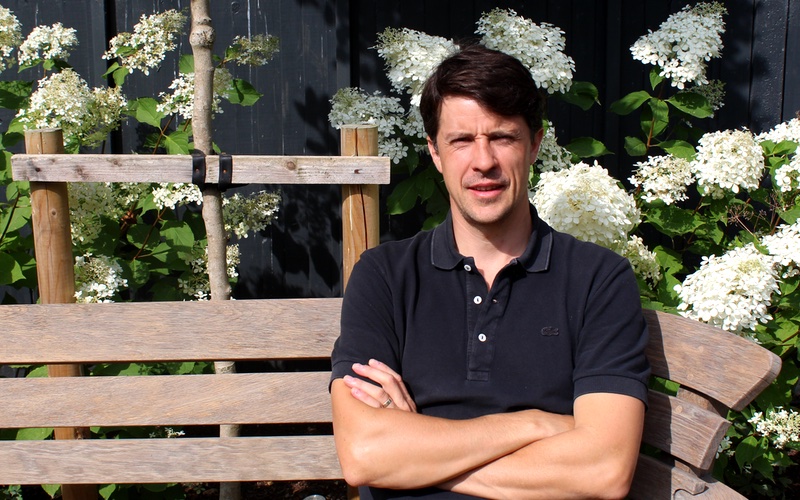THE LANDSCAPING SOLUTIONS BLOG
Welcome to our Blog. Inspiration, updates and industry trends from the team at Landscaping Solutions.
SUSTAINABLE GARDEN DESIGN - THE FUTURE OF LANDSCAPING

Ben West, Landscaping Solutions.
Garden designers and landscapers are in a unique position. We not only build gardens but bring an enormous pool of knowledge that influences the materials used, the plants chosen…and the wildlife that will visit them.
We’ll all take our own lessons from these lockdown weeks, but one of the precious things that they’ve given, rather than taken away from us, is time to think, to reassess and to create intent.
One of the most prevalent shared experiences of these weeks seems to be a greater appreciation of Nature, of its therapeutic value and how much we miss it when we cannot access it. Birdsong has become more noticeable, the air clearer. Butterflies seem more plentiful in the gorgeous weather.
Here in South West London, I’d venture that the leaves look a brighter green because of the lack of pollution.
Last year, the summit meeting at Futurescape concentrated on how the landscape industry might address climate change and I was on the podium as part of the discussion panel. When I looked around the meeting room, I saw impassioned and informed individuals seeking unity on the subject and itching for more progress within the industry.
It’s a matter that has been close to my heart for a long time. At Landscaping Solutions we began to increase the sustainability of the business some time ago. Seemingly small actions mount up to a much larger overall impact. But we believe there needs to be a more unified approach across the landscaping world.
Sustainability begins at ground level, before a spade is lifted. Putting it at the very beginning of a garden design project opens the opportunity for dialogue-rather than deciding on a material and us looking for a way to increase its sustainability through the supply chain or installation methods, it offers the chance to discuss materials and methods that the home-owner might not know to specify but which fulfil the brief.
Regenerative designs-those which add to the environment, rather than take away-are far more realistic, achievable and cost-effective for the average garden-owner than the slightly sterile designs that are so often to the fore in show gardens and which have such influence. We hope that trend-setters in the landscaping industry will push hard to move away from the unsustainable schemes that have been in vogue for so long.
This is an exciting time, full of hope. The Futurescape event made clear the hunger that members of the industry have for a different approach. There are designers around the country who put deep thought into how to make projects more sustainable, whether finding required stone onsite, using suppliers who propagate plants using peat-free compost, getting rid of waste products on Freecycle instead of sending them to the tip. There are many small steps that incrementally make a big difference, especially across an entire industry.
Here at Landscaping Solutions, we’re in the process of adding to our sustainability measures. Already, in sharing our knowledge of how to make gardens more attractive to wildlife, even with very small, easy-to-manage additions, we encourage garden-owners to widen the possibilities and create habitat that will sustain insect-life and the birds that feed on them.
For the future, we are looking to integrate an ecological assessment for each design and build. We’re examining ways to make the business zero-carbon or, at least, carbon neutral. We’re looking into the opportunities afforded by permaculture design. Can we create a suppliers’ carbon register, letting us align ourselves with suppliers with a good environmental approach? The possibilities are much wider than might immediately appear and many more ideas are under consideration.
What this means to home-owners is that they will know that their garden is not only contributing to the well-being of wildlife, giving their outdoor space an additional element to enjoy, but has made the least impact possible during its creation. It doesn’t have to mean a high-maintenance garden: minimising the necessity for power-driven maintenance tools is also a factor in the sustainable garden design.
For garden designers interested in working this way, Landscaping Solutions offers a sympathetic, enthusiastic partnership: solving problems, sharing knowledge, co-operating on plants and materials in a shared ethos, with no loss of quality or attention to detail in the build itself.
These lockdown weeks have given much food for thought to everyone, about our own lives, our working practices, the importance of personal contact, community and friends. In the context of gardens, they’ve shown us just how much we need a natural environment to recharge our batteries, to enjoy better health, to find serenity.
Now is the time to plan to act on this understanding. At Landscaping Solutions, we build award-winning gardens. We also want to build a better environment for us and our children.
We look forward to the exciting opportunities afforded by working with like-minded designers and suppliers. If you’d like to discuss the opportunities for your garden design, contact us at Landscaping Solutions now.